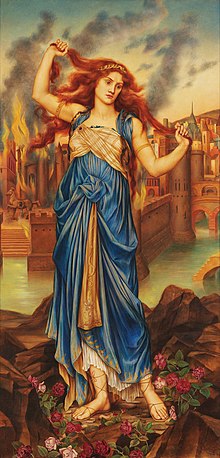

Cassandra or Kassandra (/kəˈsændrə/;[2] Ancient Greek: Κασσάνδρα, pronounced [kas:ándra], sometimes referred to as Alexandra; Ἀλεξάνδρα)[3] in Greek mythology was a Trojan priestess dedicated to the god Apollo and fated by him to utter true prophecies but never to be believed. In modern usage her name is employed as a rhetorical device to indicate a person whose accurate prophecies, generally of impending disaster, are not believed.
Cassandra was a daughter of King Priam and Queen Hecuba of Troy. Her elder brother was Hector, the hero of the Greek-Trojan War. The older and most common versions of the myth state that she was admired by the god Apollo, who sought to win her love by means of the gift of seeing the future. According to Aeschylus, she promised him her favours, but after receiving the gift, she went back on her word. As the enraged Apollo could not revoke a divine power, he added to it the curse that nobody would believe her prophecies. In other sources, such as Hyginus and Pseudo-Apollodorus, Cassandra broke no promise to Apollo, but rather the power of foresight was given to her as an enticement to enter into a romantic engagement, the curse being added only when it failed to produce the result desired by the god.
Later versions on the contrary describe her falling asleep in a temple, where snakes licked (or whispered into) her ears which enabled her to hear the future.[a]
- ^ John Lemprière, Lemprière’s Classical Dictionary, first published 1788, London
- ^ Avery, Catherine B. (1962). New Century Classical Handbook. New York: Appleton-Century-Crofts. p. 258.
- ^ Lycophron, Alexandra 30; Pausanias, 3.19, 3.26.
Cite error: There are <ref group=lower-alpha> tags or {{efn}} templates on this page, but the references will not show without a {{reflist|group=lower-alpha}} template or {{notelist}} template (see the help page).